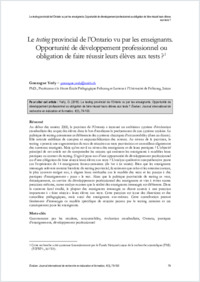Le testing provincial de l’Ontario vu par les enseignants : opportunité de développement professionnel ou obligation de faire réussir leurs élèves aux tests ?
HEP|PH FR
- Yerly, Gonzague HEP Fribourg / PH Freiburg
-
2018
Published in:
- Évaluer. Journal international de recherche en éducation et formation. - 2018, vol. 4, no. 3, p. 79-103
Gouvernance par les résultats
accountability
évaluation standardisée
Ontario
pratiques d’enseignement
développement professionnel
Results based governance
accountability
standardized testing
Ontario
teachers’ practices
professional development
English
French
In the early 2000s, the Province of Ontario has implemented an ambitious system of standardized testing of pupils’ achievement to enhance the performance of its educational system. Ontario's testing policy differentiates both traditional accountability systems (hard or soft). The testing has increased the province's results and improved alignment of the curriculum. But what about teachers and their practices? The main objective of this article is to understand the reasons that lead teachers to change their practices in contact with the testing. Is it for them an opportunity for professional development or an obligation to make their students pass a test? A qualitative comprehensive analysis was carried out on the experiences of 14 Franco-Ontarian teachers (1st to 6th grade). Although interviewed teachers note some of the benefits of provincial testing, they believe that it mostly causes them - most often despite themselves - to align some of their practices on the model of the tests and push them to teaching to the test practices. While the provincial testing policy is intended theoretically to serve the professional development of teachers and aim to avoid any harmful pressures, our analysis shows that the reality of interviewed teachers is different. Teachers see the testing more as an “obligation of achievement”. In the local context studied, most of interviewed teachers say that they are under a lot of pressure to "make students pass" the tests, pressure created by school administrators and educational consultants, but also by teachers themselves. The conclusion question this specific model of achievement promoted by the testing and its consequences on the teachers.
Au début des années 2000, la province de l’Ontario a instauré un ambitieux système d’évaluation standardisée des acquis des élèves dans le but d’améliorer la performance de son système scolaire. La politique de testing ontarienne se différencie des systèmes classiques d’accountability (dure ou douce). Elle articule reddition de comptes et responsabilisation des acteurs. Au niveau de la province, le testing a permis une augmentation du taux de réussite aux tests provinciaux et un meilleur alignement des contenus enseignés. Mais qu’en est-il au niveau des enseignants et de leurs pratiques ? L’objectif principal de cet article est de comprendre les raisons qui amènent les enseignants à modifier leurs pratiques au contact du testing. S’agit-il pour eux d’une opportunité de développement professionnel ou d’une obligation de faire réussir leurs élèves aux tests ? L’analyse qualitative compréhensive porte sur l’expérience de 14 enseignants franco-ontariens (de 1re à 6e année). Bien que les enseignants interrogés relèvent certains bienfaits du testing provincial, ils estiment que celui-ci les entraine surtout, le plus souvent malgré eux, à aligner leurs méthodes sur le modèle des tests et les pousse à des pratiques d’enseignement « pour » le test. Alors que la politique provinciale de testing se veut, théoriquement, au service du développement professionnel des enseignants et vise à éviter toutes pressions néfastes, notre analyse montre que la réalité des enseignants interrogés est différente. Dans le contexte local étudié, la plupart des enseignants interrogés se disent soumis à une pression importante à « faire réussir » leurs élèves aux tests. Cette pression est issue des directions et des conseillers pédagogiques, mais aussi des enseignants eux-mêmes. Cette contribution permet finalement d’interroger ce modèle spécifique de réussite promu par le testing ontarien et ses conséquences pour les enseignants.
- Faculty
- HEP|PH FR
- Language
-
- French
- Classification
- Education, teaching
- License
-
License undefined
- Identifiers
-
- RERO DOC 324093
- Persistent URL
- https://folia.unifr.ch/unifr/documents/312686
Statistics
Document views: 245
File downloads:
- Texte intégral: 187
